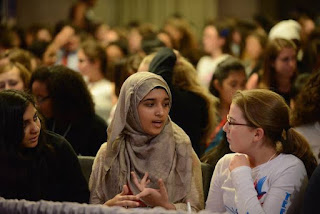Feb 20-22: Wrapping up Networks, Spectacles & Global Development
Dear All Good People,
On Tuesday, we Skype with Rebecca Dingo; on Thursday, we pause for a mid-semester review and discussion of the Visually Annotated Bibliography (Step 2 of the Multi-Genre Project). I may also work in a brief workshop on Harris's "moves" -- especially forwarding and countering -- and wrap up any loose ends you wish to have wrapped!
In anticipation of our conversation with Dingo, I'm reminded that she actually provides us a methodology for textual work that reflects a different (but complementary) approach to Mao's comparative rhetorical approach. Dingo wants to give us a uniquely "transnational feminist rhetorical methodology" to identify how arguments circulate the way they do, how they shift as they cross geopolitical boundaries, and how they reflect ideas of production, labor, and global citizenship (Dingo 7).
I suppose it makes sense to consider that all texts could be read as a set of conditions that are linked together by different economies, and in Dingo's sense, these "conditions" happen to be global and these economies happen to be "transnational." As we proceed into the third unit of our course, we'll do some more investigation together into what, precisely, this transnational rhetorical (TNR) approach looks like and can do. It may provide us with a concrete example of Mao's challenge to step out of our interpretive frames. But it may do more than that by giving us a way to question or interrogate the interpretive frame.
You do know what this means, don't you?! Yup ... most likely MORE GRIDDING!
(And don't forget about this one ...)
Looking very forward to it,
-Dr. Graban
On Tuesday, we Skype with Rebecca Dingo; on Thursday, we pause for a mid-semester review and discussion of the Visually Annotated Bibliography (Step 2 of the Multi-Genre Project). I may also work in a brief workshop on Harris's "moves" -- especially forwarding and countering -- and wrap up any loose ends you wish to have wrapped!
In anticipation of our conversation with Dingo, I'm reminded that she actually provides us a methodology for textual work that reflects a different (but complementary) approach to Mao's comparative rhetorical approach. Dingo wants to give us a uniquely "transnational feminist rhetorical methodology" to identify how arguments circulate the way they do, how they shift as they cross geopolitical boundaries, and how they reflect ideas of production, labor, and global citizenship (Dingo 7).
I suppose it makes sense to consider that all texts could be read as a set of conditions that are linked together by different economies, and in Dingo's sense, these "conditions" happen to be global and these economies happen to be "transnational." As we proceed into the third unit of our course, we'll do some more investigation together into what, precisely, this transnational rhetorical (TNR) approach looks like and can do. It may provide us with a concrete example of Mao's challenge to step out of our interpretive frames. But it may do more than that by giving us a way to question or interrogate the interpretive frame.
You do know what this means, don't you?! Yup ... most likely MORE GRIDDING!
(And don't forget about this one ...)
Looking very forward to it,
-Dr. Graban
 |
| Girl Up Summit, unfoundationblog.org, 2015 |